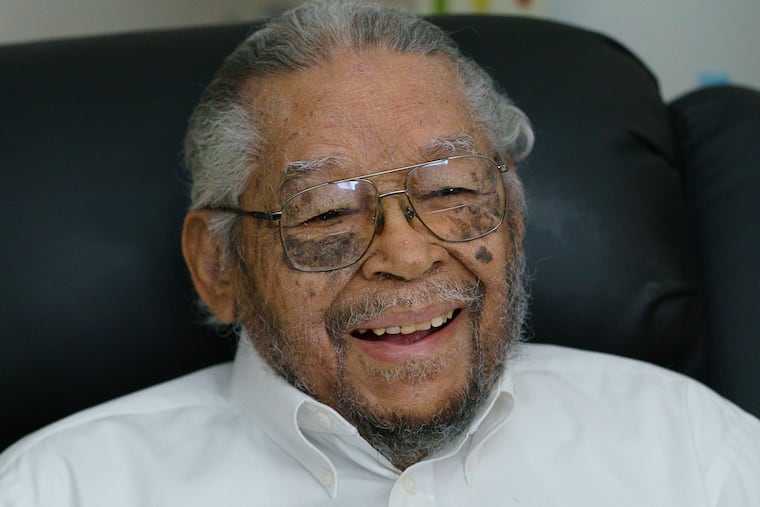Nelson Henry Jr., World War II vet who fought racism in Army, dies at 96
Mr. Henry, who was kicked out of the Army in 1945 because he was black, died Saturday of complications from the coronavirus. Mr. Henry received an honorable discharge upgrade last June.

- Nelson Henry Jr.
- 96 years old
- Lived in Logan Square
- He received honorable discharge nearly 75 years after Army expelled him
Nelson Henry Jr., 96, of Philadelphia, a World War II veteran who received an honorable discharge nearly 75 years after the Army kicked him out because he was black, died Saturday, May 9, at Thomas Jefferson University Hospital of complications from the coronavirus.
Mr. Henry was hospitalized May 1 after experiencing COVID-19 symptoms at the Watermark at Logan Square, an assisted-living facility where he had lived since 2014, said son Dean.
» READ MORE: WWII vet wants Army to upgrade discriminatory discharge to ‘honorable,’ nearly 75 years after expelling him
In a Zoom chat, the family said their farewells to Mr. Henry Friday afternoon, told him they loved him and gave him permission to pass, said Dean Henry, one of three children. “Dad, you will be with Mom,” one of the siblings said. His wife of 71 years, Lydia, died in 2016.
Mr. Henry had been under quarantine for six weeks in his apartment, his son said. Since February, at least 65 Watermark residents have tested positive for the coronavirus, a Watermark spokesperson said Monday.
Dean Henry said the sting of his father’s death was “easier to take” because an Army review board last June unanimously agreed to change Mr. Henry’s discriminatory “blue discharge” from 1945 to honorable. It found that an injustice had occurred.
After fighting for decades, Mr. Henry said he would not believe it until he received his DD-214, a discharge certificate issued upon leaving active duty under honorable conditions. He was at a loss for words when Dean presented him with the framed certificate in September.
”I waited so long,” Mr. Henry said then. “This was more like a shock, a miracle.”
Mr. Henry was among more than 48,000 soldiers given “blue discharges” between 1941 and 1945, a disproportionate number of which went to black, gay, or lesbian service members. The administrative discharge was neither honorable nor dishonorable, but was considered a badge of shame.
After several failed appeals in the 1940s, Mr. Henry stopped trying until last year. Lawyers with the Golden Gate University School of Law Veterans Legal Advocacy Clinic and Legal Aid at Work appealed in March 2019. The Army expedited the appeal because of his age.
“He really was an inspiration. He knew it was wrong,” said Elizabeth Kristen, a senior attorney at Legal Aid at Work in San Francisco.
The Army board said that it found no evidence of misconduct by Mr. Henry, that Mr. Henry had been targeted by his superiors, and “that there may have been an environment of racial discrimination” that led to his separation from the Army.
Born and raised in Philadelphia, Mr. Henry enrolled in Lincoln University as a pre-dental major. He enlisted in the Army in 1942 and was placed in a training program for junior officers.
After several minor infractions that his lawyers contend were unsubstantiated, he accepted a blue discharge to avoid a court-martial. On Oct. 17, 1945, Pvt. First Class Nelson Henry was discharged and given $63.90 in travel pay.
Back in Philadelphia, Mr. Henry raised three children with his wife. He drove a taxi for many years, earned a bachelor’s degree in psychology at Temple University, and worked for the Pennsylvania state employment office. He was a member of Omega Psi Phi fraternity.
For decades, Mr. Henry tried to forget his military experience, but his family said he struggled with his past. He said it was “like going back into slavery.”
Mr. Henry said he hoped others would be inspired by his fight “to keep on keeping on.”
“If I go tomorrow, I’ll go with a smile,” he said. “I am happy now.”
In addition to his son, Mr. Henry is survived by son Nelson K.; daughter Lydia; and a sister.
Funeral services were pending due to the coronavirus. Dean Henry said the family hopes to bury his father at a national cemetery with military honors.
Donations may be made to the American Cancer Society, Box 22478, Oklahoma City, Okla. 73123.